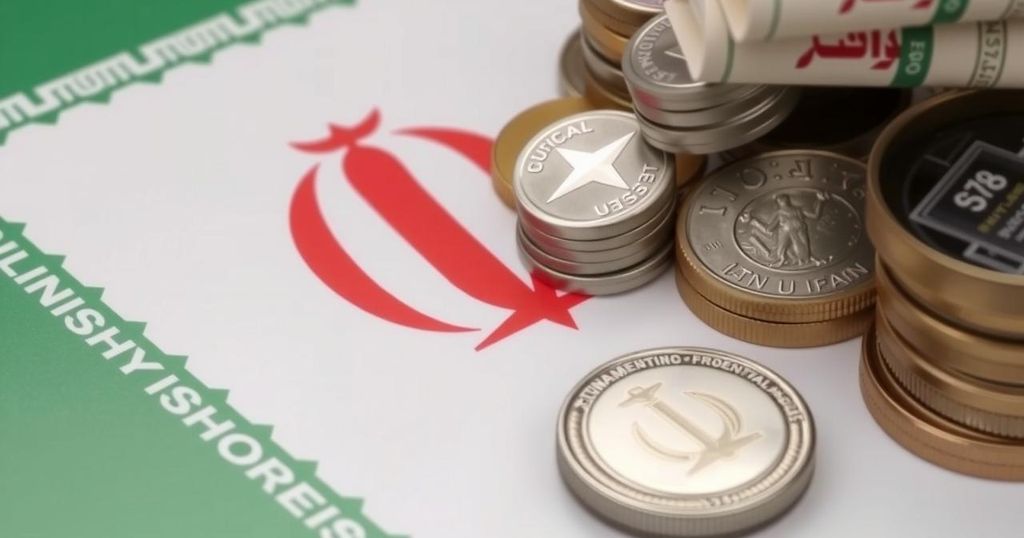Iran’s rial continues to depreciate, reaching new lows against the US dollar, raising concerns of inflation surpassing 40%. Economist Morteza Afqah warns of consequences if negotiations with the US do not progress. Geopolitical challenges further exacerbate Iran’s economic woes as allies face setbacks. Leaders acknowledge the dire situation, indicating that sanctions and rising costs threaten economic stability.
On Wednesday, Iran’s currency, the rial, tumbled to unprecedented lows against the US dollar, igniting concerns regarding the country’s economic future. Macroeconomist Morteza Afqah alerted the public through Tehran’s Khabar Online that without a swift agreement with Washington, inflation is poised to exceed 40% by the Iranian New Year, which occurs in March. He indicated a high probability of reinstating the “maximum pressure” policy against Iran, which could exacerbate the current economic situation and inflationary crisis.
Since the implementation of stringent sanctions by former President Donald Trump in 2018, the rial has depreciated nearly 20 times, representing a staggering loss of value. Notably, in just the month of September, the rial plummeted by an additional 30%. Current inflation rates remain ambiguous, yet official figures suggest stability around 40% since 2019, with essential commodities experiencing even steeper price increases. The rial reached alarming values of nearly 800,000 against the US dollar, with the British pound exceeding one million rials.
In a recent acknowledgment of the dire conditions, Mohammad Mohammadi Golpaygani, administrative chief cleric to Supreme Leader Ali Khamenei, admitted that the nation is burdened by sanctions, particularly in oil exportation. Despite the challenges, he stated, “In these circumstances, the nation’s power comes with its own challenges. After all, being a Muslim nation has its costs and is not something achieved easily.”
Moreover, Afqah expressed a bleak outlook, asserting that there is little cause for optimism within the Iranian economy. He remarked, “The short- and even medium-term outlook for our country’s economy is not promising. There isn’t much hopeful news or any so-called good news to cling to. Each individual economic and even non-economic factor is structured in a way that leads to rising costs, higher inflation, and a decline in economic growth rates.”
Compounding the economic crisis, Iran faces significant geopolitical pressure as its traditional allies, Hamas and Hezbollah, have encountered substantial setbacks. Following the weakening of these forces due to Israeli actions, the Iranian regime’s strategic investments in Syria seem jeopardized, especially after the fall of President Bashar al-Assad. As rapid shifts occurred within Syria, leading to Assad’s ousting, the incoming Trump administration appears poised to escalate pressure on Iran, further complicating the landscape in the region.
The economic situation in Iran has become increasingly precarious due to sanctions imposed by the United States, particularly since 2018. These sanctions have had a significant impact on Iran’s economy, leading to a dramatic devaluation of its currency, the rial, and contributing to soaring inflation. The Iranian government faces challenges not only from sanctions but also from geopolitical shifts in the region that undermine its influence and economic stability. As the Iranian economy continues to struggle, the lack of a diplomatic resolution with the US threatens to worsen these conditions further.
In conclusion, Iran’s economic crisis is deepening as its currency reaches historic lows against the US dollar while inflation threatens to exceed alarming rates. The persistence of harsh sanctions, alongside geopolitical challenges faced by Iran and its allies, signals a daunting path ahead for the country. Without a timely agreement with the United States, the Iranian economy may encounter even more severe turmoil, jeopardizing the nation’s financial and political stability.
Original Source: www.iranintl.com






